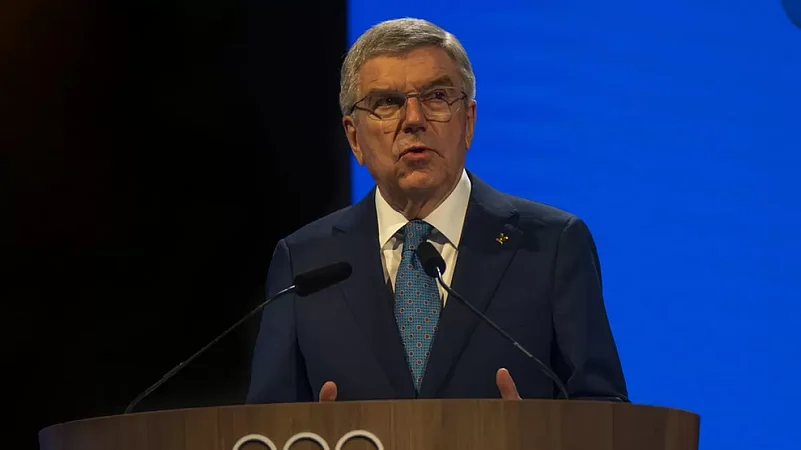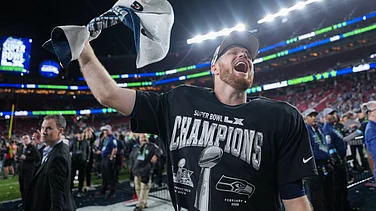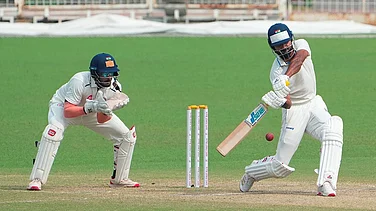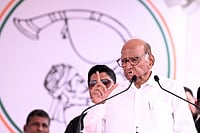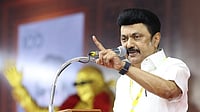Making a formal expression of interest to stage Olympic Games is just the start of a long process which involves continuous dialogue between the prospective hosts and the Future Host Commission of the IOC, says a top official of the world body a day after India expressed its intentions to host the 2036 edition. While inaugurating the 141st Session of the International Olympic Committee (IOC) being held in the country after a gap of 40 years, Prime Minister Narendra Modi on Saturday said India will leave ‘no stone unturned’ in its bid to organise the Olympic Games in 2036. (Sports News)
Paris will host the Olympics next year, followed by the Games in Los Angeles in 2028 and in Brisbane in 2031.
“We have a new process now. What would happen is theoretically the country has to come through the National Olympic Committee, and then they approach us and say we have an interest,” an IOC official told the media at the sidelines of the first day’s proceedings of the IOC Session in Mumbai.
“It’s a letter of interest. You send a letter and say ‘I want to enter continuous dialogue' and then it’s a continuous dialogue,” the official explained.
“And then, the dialogue would be opened. Important to say, for 2036, there are more than 10 countries or NOCs (National Olympic Committees) who have expressed interest. But you don’t have to announce (it) publicly.”
The official said IOC will try to help each of the 'bidding countries' or NOCs to consolidate their interest.
“(In) what are you trying to achieve, we will together construct a proposal. That will be the target. That would actually come before the targeted dialogue,” the official said.
“The first part is the continuous dialogue is helping interested parties to build a good case to see if they can hold the Games. At some point it is (when) they enter a targeted dialogue,” he added.
In case of India, a formal approach from the Indian Olympic Association (IOA) will be needed first.
“You have to make a formal approach to us and you can start that anytime,” said the official.
“The NOC is the one making (the formal approach). It happens a lot with all other countries. There’s a lot of people and politicians who typically want to own the projects. Until we get something officially from the NOC, it’s not happening,” he added.
He said the new Olympic Games host selection process has brought down the costs, like in the case of Brisbane 2032 which has seen reduction by 80 per cent.
The official also said a call on the 2036 Olympics host will be taken only after the IOC elections in 2025.
“But we’ve always said a decision on 2036 will not be happening before the elections, that is 2025. So this president has said ‘in my current term, I will not have elections of another host city for the Summer Games’.
“So nothing is going to happen until 2025, but the dialogue is continuous,” he added.
Interestingly, during the first day of the IOC Session here, president Thomas Bach was urged by most of the 99 members to seek a third term, for which the Olympic Charter will need amendment.
The official said it is important for the IOC to recognise having sports that are closer to the country and its audience and to have a simple and sustainable process of bidding.
“For example, (in) Paris, 95 per cent of the venues are already in existence, or temporary. In Los Angeles, everything is already there. They didn't have to build a single thing. But that doesn't mean that if you have a good legacy plan…
“If you say, this city needs a swimming pool, as Paris has done — they're actually building a village and swimming pool. They're saying they have a long term legacy for this, and we want this,” he said.
“So if a city in India said they want to improve their sporting infrastructure, and they want to invest this money anyway, that won't stop the bid. What we're trying to do is find what works for your city, your region. And that will be different from your city in India, to Indonesia, to the US,” the official explained.
“We are trying to see what works for your city, your region, your country.”
Talking about the timeline of the process, the IOC official said while it would take years for a bid to be processed, the duration has shortened drastically now.
“In the old days, it was seven years ahead. Now, it really depends on each side. It's always continuous dialogue. And then at some stage, when both sides think it's time to move on, then we can go,” said the official.
“We have an organising committee at a local level. That is the difference — we want to have a local flavour; so we always have an organising committee because people don't want the same Games everywhere. We want them to express your country, your culture,” he added.
During his speech to the IOC members on Saturday here, PM Modi said India will also be interested in hosting the 2030 Youth Olympics. The IOC contributes a lot in terms of organising the Youth Olympics and there is no requirement of ‘building’ infrastructure for it.
“It's different (for Youth Olympics). We actually contribute a lot more towards that,” the official said.
“It's the same principle, but it's a different process, and you wouldn't 'build' anything for the Youth Games. And we always say, the Youth Games should go to countries where you can't host the big Games in the first place,” he said.
“That's why with Youth Games we have been to 2010 Singapore and then 2014... 2030 is the next one,” the official added.






